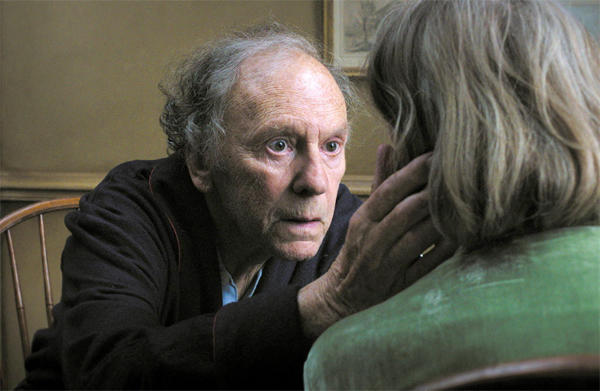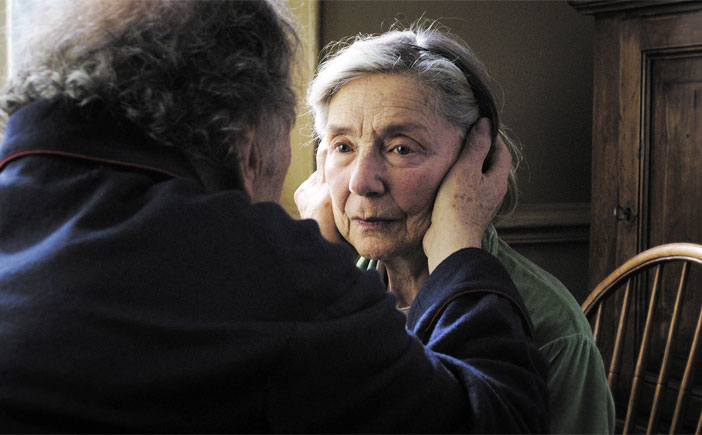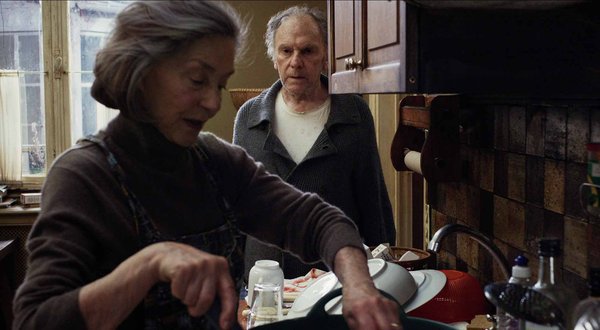Amour

Something startling happens near the end of Michael Haneke’s “Amour” (“Love”). While I won't give it away, I have the rare urge to advise you not to read any further until you’ve seen the film. It’s just that I’m quite grateful I didn’t read any reviews before going in. I will only say that while Haneke’s pictures are always tricky, the trickiness here is that he makes a part of you long for that startling thing to happen.
"Amour" is the story of an elderly Parisian couple, Georges and Anne (Jean-Louis Trintigant and Emmanuelle Riva) and how they cope with the end of the woman’s life. It is the kind of end we all hope to avoid. The couple is enjoying their winter years together until a scary moment when Anne suddenly zones out at the table. Later she suffers a stroke, and she deteriorates rapidly. She suffers physically, psychically. Georges cares for her from home after she says she can't bear to go back to the hospital.
Whereas Haneke’s work usually explores pain--the human capacity to inflict it, to bear it--“Amour” is an unflinching look at the limits of what someone will do to take away the pain from a loved one. Wouldn’t you do anything?
He give us one of his trademark long shots of a crowd, a view from the stage as an audience waits expectantly for a piano recital to begin. (This will be the one time in the film when we are outside the couple’s apartment.) Instead of cutting, Haneke permits our eye to roam the image as it will. Eventually we find our couple. Haneke has placed them just off center, gently drawing our eye to them.

But if his style harnesses cinema's power of ambiguity, so too does he harness the medium's essentially direct nature. Only the finest of novelists could equal the power of the simple fact of Riva’s twisted, helpless face. Haneke is a master of technique on the level of Hitchcock, even if his technique amounts to just giving you the facts. (There is no score to tell us how to feel, either). Each camera setup in the apartment is purposeful. Sometimes we see from the point of view of Georges’s favorite chair.
The apartment is the couple's natural habitat. It's funny: we only see it as an “old people's apartment” when younger people visit and we see the place through their eyes, surrounded in the slightly formal sitting room by photographs, books, a piano, the artifacts of a long, shared life. Anne is a retired piano teacher,and one of her visitors is a former student (Alexander Tharaud), a slightly callow young man who's become a big success as a pianist. (It was his recital the couple attended.) His reaction to her condition inadvertently wounds her. He finds her sad. It's the one way she can’t bear to see herself.
There is also Georges and Anne's adult daughter, played by Isabelle Huppert. In a moving moment she confides to her father that as a child she found the sound of their lovemaking comforting. She grows increasingly worried about her father’s ability to care for her mother. At one point he resorts to hiding what’s become of Anne from her eyes.
“Amour” is a very rare movie experience: intense, shocking, tender, brave, deeply compassionate towards its subjects, finally gorgeous. It’s not like I expected a Haneke picture to leave me unscathed, but there were moments here when my jaw just dropped. I know I won’t see any braver performances this year than Emmanuelle Riva’s and Jean-Louis Trintigant’s.

Above all, it’s honest. Georges is endlessly patient with Anne, except when he’s not. He’s tender, except when he's mean in a moment of helplessness and frustration. Shuffling through the rooms of the apartment, Trintigant--the onetime heartthrob, now heavy with years--makes you feel this man’s helplessness as his wife’s condition deteriorates.
And yet “Amour” is about the beauty of life, too. It’s there in Anne’s favorite paintings: at one point Haneke fills his frame with them. And it’s there in the ending as well, somehow. It's an ending I never would have expected from a director as unsparing as Haneke, and I think it’s touched by grace. In a very, very understated (indeed, almost offhand) way, it suggests a hope and comfort beyond the hopelessness we’ve just seen.
There is a lot to admire on a technical level about “Amour.” What a pure distillation of theme. What a fine sense of structure. And yet what humbles us, finally, is how toweringly human it is. It is as intimate and personal as I can imagine, yet its power comes from the universality of the situation--of aging and dying. In “Amour,” a man does everything he can to hold onto the woman he loves, to cradle something that needs to fly away. He holds on, until it becomes time to love her in a different kind of way.
Rating: *****
--January 23, 2013
Key to ratings:
***** (essential viewing)
**** (excellent)
*** (worth a look)
** (forgettable)
* (rubbish!!)


 Scott Pfeiffer
Scott Pfeiffer
Reader Comments